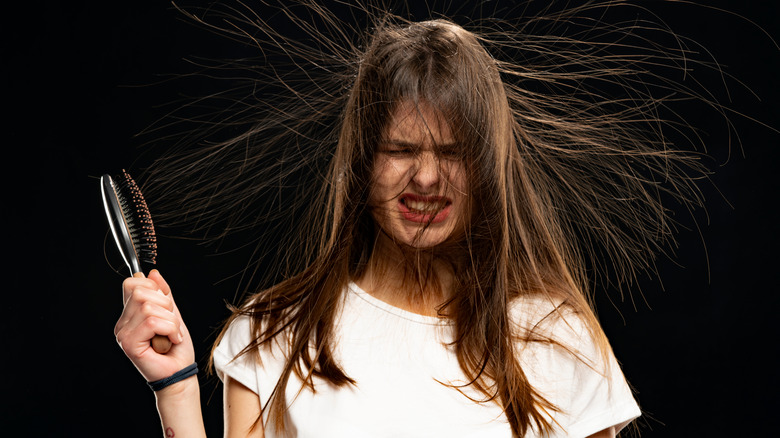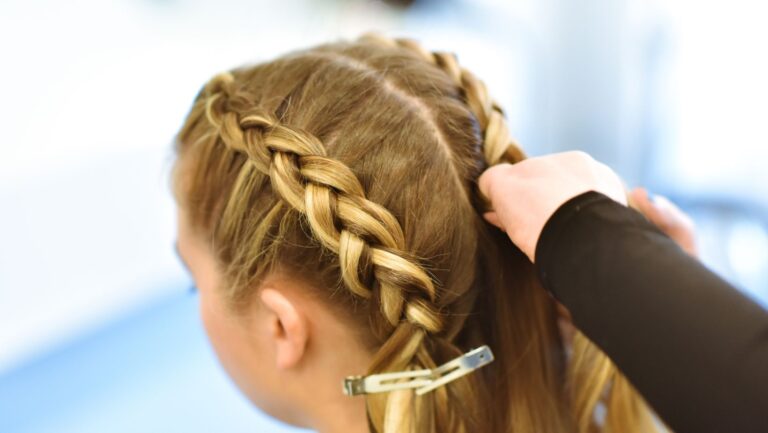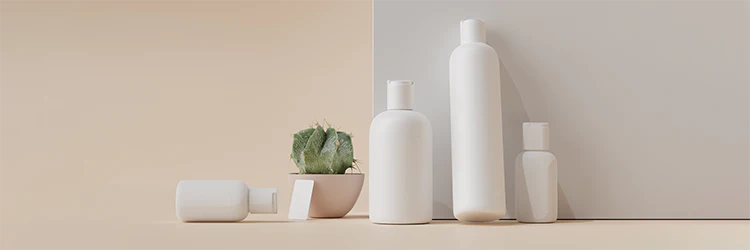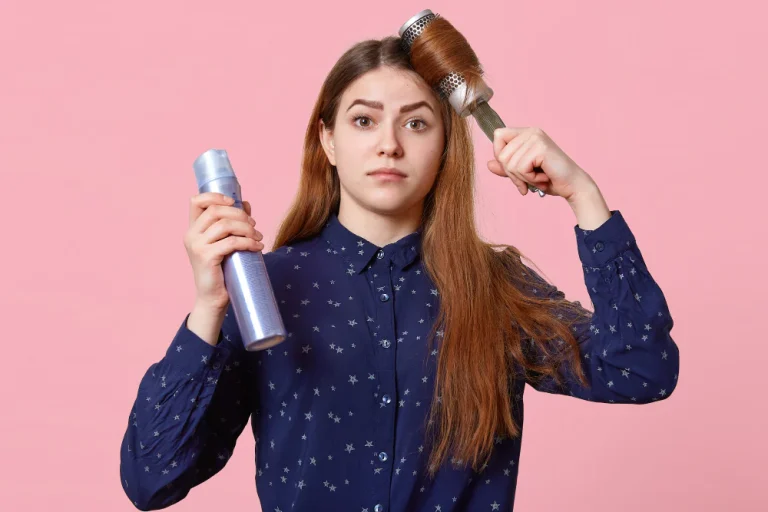Why Is My Hair Static All Of A Sudden?
As I looked in the mirror this morning, I was horrified to see my hair looking like I had stuck my finger in an electrical socket. My usually smooth locks were a frizzy, staticky mess, with flyaways shooting out in all directions. Sound familiar?
You are not the only one who has experienced a sudden case of static in your hair. Let us dig into the reasons behind bad hair days caused by static electricity and frizz, along with tips for fixing the problem.
An Introduction To The Menace Of Static Hair
Contents
- An Introduction To The Menace Of Static Hair
- Why Is My Hair Static All Of A Sudden? Static Electricity Explained
- Why Is My Hair Static After Brushing? Blame It On Friction
- Post-Shower Static Hair: Blame The Towel, Blow Dryer, And Hard Water
- What Factors Promote Annoying Static Hair?
- 8 Tips For Smoothing Frizzy, Static Prone Hair
- 1. Be Gentle When Drying – Ditch The Vigorous Towel Rubbing
- 2. Clarify With Chelating Shampoo And Use Moisturizing Formulas
- 3. Swap Plastic Hair Brushes For Metal Combs And Natural Bristles
- 4. Blow Dry With An Ionic Dryer On Low Heat
- 5. Apply Leave-In Conditioner Before Styling
- 6. Lock In Moisture With Hair Oils And Deep Conditioning
- 7. Use Anti-Static Sprays And Anti-Frizz Sheets
- 8. Sleep On Silk Pillowcases For Smoother Morning Hair
- Conclusion: Embrace The Smooth, Frizz-Free Life
During the cold winter months, static hair, frizziness, and flyaways seem inevitable. I’ve had my fair share of bad hair days battling the forces of static electricity.
No one wants to walk around looking like they got caught in a wind tunnel, with hair standing on end! Unfortunately, science is working against us in the winter, making static locks a common predicament.
Static hair is the mortal enemy of a sleek, smooth hairstyle. It ruins your blowout and painstakingly flat-ironed tresses in an instant, replacing them with a hairdo fit for a mad scientist.
So why does this unwelcome frizz and static strike all of a sudden, when we least expect it? Let’s break down the science behind this haircare nemesis.
Why Is My Hair Static All Of A Sudden? Static Electricity Explained
The shocking truth behind sudden static hair is static electricity. Chances are you learned about static electricity in elementary school science class. Remember rubbing balloons on your sweater and sticking them to the wall? Or giving your classmate a zap from your static charged fingers? The same principle causes locks to go haywire.
Static electricity refers to an imbalance of electrons on a surface, resulting in one object having more negative charge and another with more positive charge. This charge imbalance generates attraction or repulsion between surfaces or particles.
When it comes to your hair, the electrons can transfer between individual hairs, making them repel and stand away from each other. The result? Frizzy, staticky hair that resembles the bride of Frankenstein, rather than a sleek and polished ‘do.
Why Is My Hair Static After Brushing? Blame It On Friction

One of the most common static hair culprits is brushing. Ever notice your hair gets progressively more electric and unruly the more you brush it? This is due to the age-old physics concept of friction.
Friction results when two surfaces rub against each other, like your hair and brush bristles. This contact transfers electrons between the surfaces, causing a buildup of static electrical charge. The more vigorous the brushing, the more friction, and the higher the static charge. Too much brushing to smooth things down can backfire, causing a frizz explosion instead.
Post-Shower Static Hair: Blame The Towel, Blow Dryer, And Hard Water
If your hair is frizzy and charged with static after washing, a few different factors could be to blame. Let’s start with your towel drying technique. Vigorously rubbing your hair, even with a soft towel, causes friction which imparts static electricity to your damp locks.
Blow drying can also contribute static and flyaways if you aren’t careful. The fast moving air from the dryer causes evaporation of water molecules from your hair, creating friction and transferring electrical charge to the strands. Using high heat speeds up the process and makes static even worse.
Hard water wreaks havoc as well. The minerals in hard water leave a rough, crunchy residue on your hair that makes it prone to static.
What Factors Promote Annoying Static Hair?
A variety of environmental and haircare factors can either reduce or worsen static frizz. Here are some of the main elements at play:
- Dry winter air – Heated indoor air and cold, dry outdoor air both have low moisture content. This allows static charge to build up easily, compared to more humid conditions.
- Dry, damaged hair – Hair that lacks moisture is extra brittle and prone to breakage. The broken hair shaft ends rub together easily, creating frizz and static electricity.
- Humidity – High humidity makes hair limp and heavy, which can reduce flyaways. But humidity also causes frizz as the hair expands, increasing the surface area prone to static.
8 Tips For Smoothing Frizzy, Static Prone Hair
Ready to wage war against static locks? With the right techniques and products, you can transform frizzy hair into sleek, smooth strands. Here are my top 8 tips for fixing static prone hair:
1. Be Gentle When Drying – Ditch The Vigorous Towel Rubbing
Instead of using a regular towel, switch to a microfiber hair towel or old cotton t-shirt to gently squeeze moisture from your hair. The smooth fabrics won’t cause as much friction or disturbance to the cuticle. Avoid vigorously rubbing your hair, which can promote frizz and static electricity.
2. Clarify With Chelating Shampoo And Use Moisturizing Formulas
Products buildup and hard water minerals can rough up the hair cuticle. Use a clarifying shampoo containing chelating agents once a week to deep clean. For regular washing, pick a moisturizing shampoo and conditioner formulated to smooth the cuticle and add hydration.
3. Swap Plastic Hair Brushes For Metal Combs And Natural Bristles
Plastic brushes promote static because they don’t conduct electricity well. Switch to wide-tooth metal combs which allow electrons to pass through evenly. If using a brush, choose one made with natural boar bristles or other conductive materials. The bristles will help distribute your hair’s natural oils down the shaft.
4. Blow Dry With An Ionic Dryer On Low Heat
Ionic hair dryers emit negative ions that help diminish static electricity and frizz for smoother, shinier hair. Keep the dryer 6 inches away and use a lower temperature setting to minimize flyaways. Finish with a quick cool shot to seal the cuticle.
5. Apply Leave-In Conditioner Before Styling
Leave-in conditioners provide extra hydration and smooth down the cuticle. They act as an anti-static coating by reducing friction between hair strands. Apply from mid-shaft to ends before heat styling or air drying.
6. Lock In Moisture With Hair Oils And Deep Conditioning
Nourish dry, thirsty hair by applying multi-benefit hair oils containing nutrients like argan, coconut and marula oils. For an intensive moisture treatment, apply a thick hair masque and let it soak in with a heated cap. The hydration helps minimize static electricity and frizz.
7. Use Anti-Static Sprays And Anti-Frizz Sheets
Spritz on an anti-static spray or smoothing mist containing conditioning agents and silicone to coat hair and neutralize static charge. There are also anti-frizz sheets infused with positively charged ions to counteract static electricity when wiped over hair.
8. Sleep On Silk Pillowcases For Smoother Morning Hair
Cotton pillowcases can cause friction, absorbing moisture and promoting frizz while you sleep. Switch to silk pillowcases to minimize disturbances. The smooth fabric allows you to wake up with fewer flyaways and less static electricity.
Conclusion: Embrace The Smooth, Frizz-Free Life
While dry winter air makes hair prone to static, taking the right precautions helps fight frizz and flyaways. Be gentle when washing and drying your hair, use anti-static products, and moisturize your hair well to keep your locks smooth and static-free.
With these tips, you can nix the frizz and embrace good hair days all season long!

Founded by Sophia Rodriguez, IGXO Cosmetics is a PETA-certified, cruelty-free, and vegan makeup brand.





